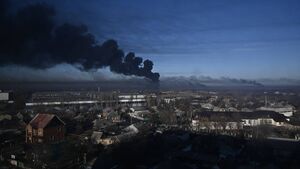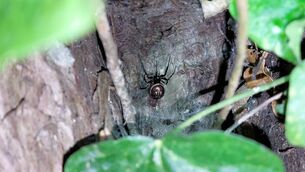Ukraine was ill-prepared for Russian invasion

Black smoke rises from a military airport in Chuguyev, near Kharkiv, on February 24, 2022 - the first day of the Russian invasion of Ukraine. Picture: Aris Messinis/AFP via Getty Images
“Larry, we have to close the beaches," Police Chief Martin Brody (played by Roy Scheider) along with marine biologist and shark expert Matt Hooper (Richard Dreyfuss) is desperately trying to convince stubborn Mayor Larry Vaughn (Murray Hamilton) of the presence of a killer shark terrorising the waters off their Amity Island. Laughing off their concerns, Vaughn orders Brody to do what he needs to do to make the beaches safe but "for Christ's sake tomorrow is the 4th of July and we will be open for business..."
Spielberg’s 1975 classic movie, , has a sun-soaked beach town, led by a mayor in a loud anchor-patterned suit, stubbornly refusing to believe that a monstrous killer shark is lurking just offshore. His refusal to accept the evidence staring him in the face is simply because it would mean closing the beaches during the crucial summer season. Instead, the Mayor downplays the danger, insisting that the town depends on tourism and that a panic would be worse than the potential threat.
Even after the first confirmed attack, Vaughn continues to deny and deflect, blaming a boat accident rather than a rogue great white. It’s only after the deadly horrific July 4th attack, where the shark is witnessed by the panicked beachgoers and nearly kills his own son, that he finally accepts the facts. In one of his most telling moments, he stares blankly at the chaos and mutters, "Martin, my kids were on that beach too." It’s a moment of realisation and remorse, but by then, it's too late to undo the damage.
Donald Trump recently echoed Kremlin talking points when chastising Ukrainian President Volodymyr Zelenskyy over the Russian invasion of his country.
“You should have never started it. You could have made a deal," he claimed.
The US President likely would have similarly criticised Mayor Vaughn over not appeasing the Great White Shark with an old granny or two. Yet Zelenskyy’s inaction in the lead-up to the February 24 invasion does echo that of the mayor of Amity Island. For months before, the governments of the United States, the UK and military experts were loudly voicing that the vast amount of Russian tanks and infantrymen weren’t just flexing on the border - they were going to roll across it. Yet many in Ukraine, from ordinary citizens to government officials, clung to the belief that it wouldn’t or couldn’t happen.
Despite years of tensions and the 2014 annexation of Crimea, Ukraine was not fully prepared for the full-scale 2022 Russian invasion. Western intelligence agencies had repeatedly warned that an attack was imminent, but Zelenskyy and his government downplayed these predictions, fearing mass panic and economic collapse. After all, hadn’t Russia already rattled sabres in 2014? Hadn’t Ukraine been living in a tense, uneasy peace since? To openly admit an invasion was imminent would mean facing the unthinkable: total war.
But just as Mayor Vaughn refused to close the beaches until bodies washed ashore, Ukraine’s government hesitated to prepare for the worst until the tanks were literally on their doorstep. And like the unfortunate swimmers of Amity Island, ordinary Ukrainians paid the price - even as Zelenskyy heroically remained in Kyiv with his cabinet.
Unlike Russia, which had spent months mobilising troops, Ukraine did not enact widespread defensive measures before the invasion. Key cities like Kherson fell quickly due to inadequate fortifications or army unreadiness, with many of Ukraine’s best troops concentrated in the east, anticipating a limited conflict rather than an all-out assault from multiple directions.
During January 2022, my wife and I were in her city of Poltava, in north-eastern Ukraine, with family and friends, before taking a flight to Antalya in Turkey for a week’s holiday from January 21. It was a strange time. I listened to the increasingly shrill warnings of an imminent Russian invasion on my English-speaking internet, as Putin massed his vast army along the border. Yet, everyday Ukrainians were in denial, lulled into false security by their non-English speaking media. The dour taxi driver who expertly drove us through winter slush and wet snow for two hours to Kharkiv Airport laughed at the thought of Slavic brothers fighting each other. What did the Americans know? A war with Russia simply couldn’t happen.
Yet I had a jarring, uneasy feeling while listening on my headphones to impending doom from Western correspondents as everyone around me was chatting, shopping, eating and generally doing what one does when not expecting their small-but-modern airport to be blown to bits by missiles a month later. Our week in the old city of Kaleiçi, lined with Ottoman-era houses, should have been relaxing. But I couldn’t sleep and took to walking the narrow cobbled streets around the harbour. Even in Turkey, Putin was seen as an expert strategist, causing his enemies to second-guess him. A few locals I met tried to convince me no attack was coming and Putin was simply playing three-dimensional chess with the West. But I kept walking.
On our return to Ukraine, I left for work in Ireland and my wife stayed with her ill father to follow me later. Back in Mayo, the drumbeat of war was more emphatic and I made the decision to book three tickets for her and two friends to spend a week in Istanbul from February 15. Reluctantly she went, but I angered them by later extending the return tickets a few more days.
"Look, nothing is going on Liam – it’s time to go back to Poltava," they said.
I emailed a US friend on February 22: “I saw Putin’s display last night - truly awful and showing how absolute power corrupts an already flawed man. His hatred of what Ukraine stands for is breathtaking and does not bode well. Personally, I think he will invade the rest of Ukraine, probably not soon but when Ukraine reacts as they must do when the Russian-supported separatists attack their forces. That could be tomorrow or next week, but I feel it is coming."
Two days later, as Russian forces invaded, Kharkiv Airport was destroyed in an attempt to cripple Ukraine’s air capabilities and gain control of strategic locations near the Russian border. My wife has never returned home. Her father refuses to leave.
Much like Amity Island, once the enemy struck, Ukraine chose to fight. Despite initial setbacks, the country adapted rapidly, arming civilians, enacting emergency measures and rallying public support. The military regrouped and forced Russia into costly battles, particularly in Kyiv, preventing a quick Russian victory. Western aid surged, providing weapons, intelligence and financial support, turning what could have been a swift collapse into a prolonged and heroic resistance, lasting to today.
Yet might it have been different? Sometimes the truth is too awful for us to acknowledge. But that is rarely a good reason to do so.





